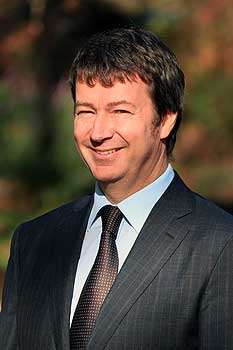Former diplomat brings range of skills to International Office

From policing intellectual property trademarks at the Spanish Formula One Grand Prix to securing market access for New Zealand potato exports to Korea, Michael O’Shaughnessy draws on a wealth of cross-cultural experiences in diplomacy in his new role as Massey's international relations director.
Learning the intricacies of how other societies, cultures and governments think and operate is all part of the valuable knowledge he brings to the University from his six years at the Foreign Affairs and Trade Ministry.
His newly created role involves coordinating and being first contact point for international partnerships, visiting delegations and Vice-Chancellor Steve Maharey’s overseas missions. It stems from the International Office’s makeover and launch of its ambitious internationalisation strategy last year for 2011-15, which aims to raise Massey’s profile internationally and to invigorate its teaching, research and recruitment with a greater international, inter-cultural dimension.
Mr O’Shaughnessy’s involvement with other countries, cultures and education systems dates back to his university days when he was the first Victoria University exchange student to participate in the University of California’s Education Abroad Programme and completed the final year of his Bachelor of Arts degree at the University California in San Diego.
He then worked as a legal researcher for a London law firm, learned Spanish and moved to Barcelona, where he worked as a Spanish and Catalan translator, interpreter and editor for 13 years. One of the highlights was working for the Spanish Formula One Grand Prix in responsible for policy relating to intellectual property infringements in merchandising. “There was a Keystone cops element to it, going on raids with Spanish police chasing Italian wheeler-dealers around huge carparks, often dragging them out from under cars with bags of counterfeit products,” he recalls.
Back in New Zealand, he enrolled for a PhD in History at the University of Auckland, focusing on the experiences and memories of the few New Zealanders who went to Spain during the Spanish Civil War (1936-39). His paper ‘For Those Who Like a Breezy Yard’ won the best Graduate Paper Award at the 2004 New Zealand European Studies Conference.
But he had to abandon his studies and return to Wellington to be with his sick father. There, he worked as an editor for the Department of Statistics, where he was set to become the Editor-in-Chief of the New Zealand Official Yearbook when he was offered a policy position at the Ministry of Foreign Affairs and Trade (MFAT).
His first role was with the North Asia Division working in China, Taiwan, Hong Kong, Japan and Korea in the areas of science and technology cooperation, investment, film and cultural diplomacy. He was posted to Korea, where his first challenge was to learn the language; “very hard – the hardest thing I’ve done”.
In the embassy, he was responsible for trade and market access, economic reporting (which included covering the global financial crisis and Korea’s hosting of the G20 Summit), agricultural cooperation, and research, science and technology cooperation.
As well as potatoes, O’Shaughnessy was also able to secure market access to Korea for New Zealand bovine semen exports. His next role was in MFAT’s Australia Division, where he looked after social issues and the political relationship.
O’Shaughnessy says he aims to add value to Massey’s ever-growing network of international relationships as part of what he dubs “a virtuous circle” of networks and influence. “I’m very keen to learn from staff in the colleges and schools about what they are doing, what they want to do, and how they want to do it, in terms of international activities,” he says.
Massey’s Internationalisation Strategy is not solely about getting more students to come here, he says. “It’s about embracing internationalisation in all its aspects, from collaborations with overseas universities and governments to student mobility, and quality student services and pastoral care.”